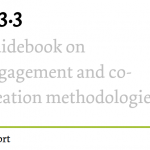Guidebook on engagement and co-creation methodologies.
This guidebook starts with an introduction on the concept of outreach and engagement methodologies and activities. Besides, giving this general overview it presents three exemplary engagement models, outlines how BLOOM’s engagement activities can be aligned to the Grand Societal Challenge of Food security, sustainable agriculture and forestry, or marine and maritime and inland water research, and highlights activities that are considered to be both engaging and relevant to BLOOM’s approach of empowering citizens and raising awareness for bioeconomy.
Co-creation processes will be at the heart of BLOOM’s five regional hub activities because co-creation follows an approach of involving different perspectives and collaboratively designing tools, materials, processes, activities or strategies. A variety of targeted creative methods and creative tools feed into this guideline support the hub leaders designing the most appropriate suitable workshops and to choose most fitting methodologies to reach their goals. Therefore, besides background information on co-creation, its potential and general information about organising such workshops, this section provides also as practical support a selection of co-creation methods and an example of a co-creation workshop moderation sheet, to be adapted and used by the BLOOM hubs.
All in all this guidebook is set up to encourage the BLOOM partners and hubs to structure, plan, and implement an engagement model tailored to the specific needs, drivers and barriers of each hub and thus should serve as a pool of engagement methods, activities and background information and offers assistance with planning the BLOOM co-creation workshops.

